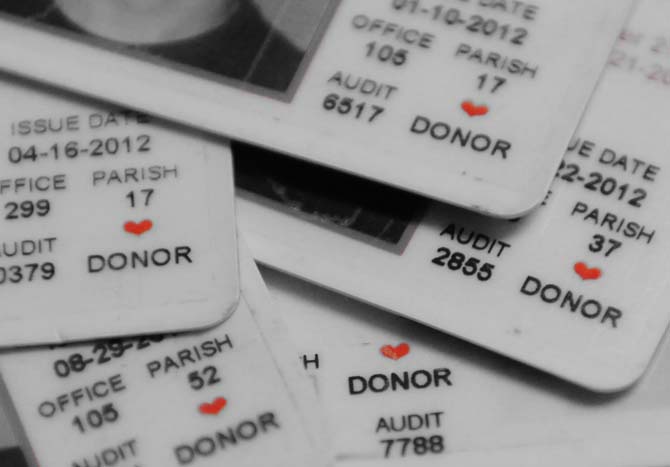Not many things get me more worked up than a medically selfish person. You know, those people who refuse to donate blood because they’re afraid of needles. Or the ones who won’t sign up to be an organ donor because they think their organs will still be useful in a casket.
People like these make me ashamed of the human race. Generally, I think humans are pretty nurturing mammals who tend to put others first — a trait that’s rare in almost all other species.
But lately, my high hopes for mankind have been shot down. This week, the entire LSU student body has the chance to become an organ donor. I guarantee that the percent of people who will actually register is going to be smaller than the percent of Democrats in this state.
That’s saying something.
According to Donate Life America, only 30 percent of Americans are even aware of the steps to become an organ donor. Maybe our country is at fault for failing to educate our citizens on this simple but crucial act.
Sure, I’ll admit it’s a little weird thinking about your kidney and liver working inside of someone else after you’ve seen the light at the end of the tunnel. There’s a long list of reasons why people feel like organ donation isn’t for them, but I’m about to destroy those reasons.
If you have some kind of medical problem or religious reasoning behind keeping your organs in tact, then congratulations, you are exempt from my upcoming tirade.
Everyone else, buckle up.
One of the more common myths states that if you end up on your deathbed in a hospital, doctors won’t work as hard to save your life because you are an organ donor.
If that were the case, then I’m sure law and order would make sure your doctor spent the rest of his or her life in a jail cell. If you don’t trust doctors to do their job, which is first and foremost to save your life, then you shouldn’t be in a hospital to begin with.
The modern Hippocratic Oath that doctors take says, “Above all, I must not play at God.”
Organ donors undergo even more tests than others to adequately ensure that they are really dead before the donation process begins. Toss aside that scary-movie scenario where they cut open your stomach when you’re still alive – it isn’t going to happen.
Another objection against donations is that people want to have an open-casket funeral. Disregarding the fact that open-caskets are slightly creepy, they also have no impact on donating organs.
You can donate tissue and even your eyes – specialists make your body identical to how it would look if you still had these organs. No one can tell the difference.
According to Donate Life America, about 18 people die each day because of the lack of donated organs, and every 10 minutes,
another name is added to the
waiting list.
If you’ve ever seen Will Smith in “Seven Pounds” — and completely bawled at the end of the movie, like me — then you might understand how important organ donations are to the people on a waiting list.
If you let go of the narcissistic attitude you’ve been holding onto and think of what your donation means for the person on the receiving end, you might have a change of heart.
Knowing that my eyes could help someone see the color of grass for the first time overrides the uncomfortable knowledge that they would no longer be in my skull.
We need to end the irrational connection we feel to our organs after death. I promise, our organs don’t reciprocate the attachment.
Annette Sommers is an 18-year-old mass communication sophomore from Dublin, Calif.
Opinion: Objections to organ donation selfish, irrational
November 18, 2013





